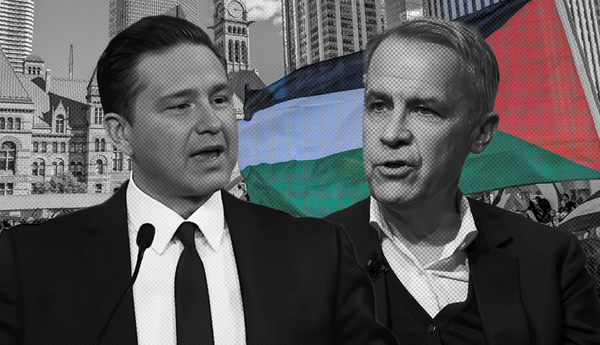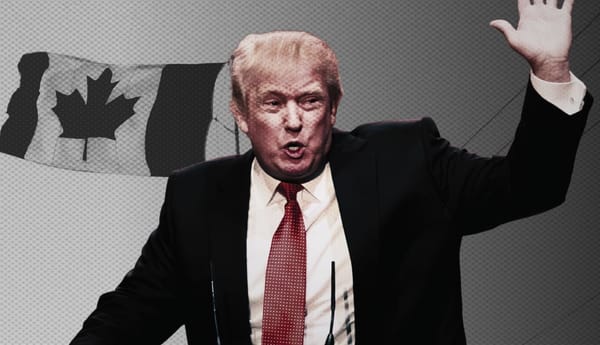Samuel Cooper — better known as “Sam Cooper” or “ScooperCooper,” as he labels himself on Twitter — will be leaving Global News on Friday.
In recent months, I’ve been closely following Cooper’s work, particularly his series of articles on MP Han Dong and alleged Chinese interference in Canadian elections. In my own writing, I’ve described this work as untrustworthy, lacking evidence, missing important information, “unconvincing,” “shoddy,” “inherently racist” (due to an absence of proof, not because of any of his personal views) and many other not-so-flattering words.
As such, it should be no surprise that I’m happy Cooper and Global News are breaking up. I don’t know Cooper, I’ve never met him and I have no opinions on him as a person — I just don’t like his work, and think mainstream media will be a better (or more accurately, less shitty) place without it.
I’ve long been a critic of Canadian media’s anti-China coverage. Cooper is one of, if not the, biggest generator of it, at least on the news end. As of today, Cooper’s author page at Global News — where he has worked since 2018, following time at the Vancouver Province and Vancouver Sun — lists him as being the author or co-author of 153 articles. I went through them all, and found that 72 per cent of them (110) contain the words “China” and/or “Chinese,” referring to the country, the people, and/or organizations and groups both there and in Canada. Many of these articles focus exclusively on China. Cooper’s best-selling 2021 book, Wilful Blindness, also centres on China.
Cooper has blamed China — its government, some people within it and/or members of its diaspora, in full or in part — for everything from money laundering in casinos, the rise of real estate prices in Vancouver, the flood of fentanyl into Canada, election interference, mask and other PPE hoarding, faulty masks, the continued imprisonment of Michael Spavor and Michael Kovrig, and more. All of this, of course, has happened at the same time as Canada’s government, major parties, intelligence agencies and state apparatus more broadly, have fixated on China, in line with its international allies.
Cooper has had direct contact with at least some of these agencies in various forms, and seems to be proud of it. For example, in one recent author bio, he boasts that he “presented his anti-corruption findings to Canadian law enforcement agencies, officials in the Pentagon, legal professionals, and academics.” His recent work also proudly announces other types of communications with these agencies, given that much of it is entirely based on what anonymous sources within them have to say. These articles position him as a human microphone for intelligence agencies, or, as described by his managing director at Global News, the possessor of “deep sourcing and trust” within “the national intelligence community.”
Here, for example, are some deeply insightful snippets from his article that is at the centre of a lawsuit against him, and which are typical of his reporting: “according to two separate national security sources”; “both sources said”; “the two sources said”; “the two national security sources informed Global News, citing CSIS reports”; “the national security official said”; “the two sources said”; “sources say that CSIS”; “the two sources said”; “the national security official said”; “CSIS believed [...] the two separate national security sources said.”
Global News lawyers stated, in a filed document, that Cooper’s reporting wasn’t “presented as factual findings” but rather merely as “allegations.” As reported by the CBC, “The news outlet also wrote that it spent ‘months’ conducting ‘rigorous fact-checking, editing and research’ on the stories and insisted they ‘were not published on a rushed basis.’” In other words, if this is true, even months of intense fact-checking wasn’t able to prove that the allegations Global News planned to platform were true (just that another anonymous source said they were).
Despite all of this, Global News appears to be sticking by the story, for now, at least. CBC reported that an email from a managing director at Global News to staffers about Cooper’s departure framed it as a decision on Cooper’s part “to pursue a personal journalism project.” The director added that “eight months after his reporting on [intelligence agency documents] first appeared, the debate over China’s alleged interference remains central to the national conversation.”
The manager is certainly right, though I’m not sure why he’s boasting about it.
For example, Cooper’s reporting was a focus of special rapporteur David Johnston’s first report into election interference, which found that a major allegation made in Cooper’s article against Dong is “false.” Cooper’s reporting also prompted some national conversation about how he is:
1) being sued, along with co-defendants, by Dong for $15 million in damages, alleging the defendants “maliciously destroyed [his] hard-earned reputation and career and [exposed] his family to a campaign of hateful messages and threats, including death threats”;
2) being sued, along with co-defendants, by former Ontario MPP Michael Chan for $10 million, alleging Cooper “engaged in an ongoing and relentless campaign against [him]”;
3) currently facing, along with Global News, a libel notice from Ontario MPP Vincent Ke, alleging their reporting exposed him to “a campaign of hateful and racist threats and attacks.”
(The claims have not been proven in court. Global News rejects Dong’s claims, and does not appear to have filed a statement of defence against Chan.)
Cooper hasn’t officially announced what his next move will be, but the “personal journalism project” mentioned by his managing director appears to be a new investigative publication hosted on Substack. [After this article was written, but before it was published, Cooper posted an announcement about the project to his LinkedIn page.] Luke LeBrun, the editor of PressProgress, reported yesterday that Cooper legally incorporated the name of his new publication in March 2022, and that the Substack was created this February. LeBrun characterizes this as Cooper potentially “quietly planning” to launch the project while at Global News. I’m not so sure that’s true. After all, airlines don’t equip planes with life jackets and oxygen masks because they’re intending to crash; it’s always crucial to plan ahead, just in case. I hope we’ll find out more about Cooper’s departure in the future.
His next move, meanwhile, may end up going well. He certainly has a committed audience, and I wouldn’t be surprised if outlets continue to pick up what he’s putting out. Regardless, I’m relieved that his work (probably) won’t be shared directly in Corus Entertainment outlets online, on the radio or on TV, as it has been in recent years. This is a massive audience, and while I will continue to critically analyze Cooper’s work, I’m glad he’ll have a more difficult time reaching it.
CORRECTION: This article has been updated to note that Cooper did post an announcement about his new project on LinkedIn before this article was published.







